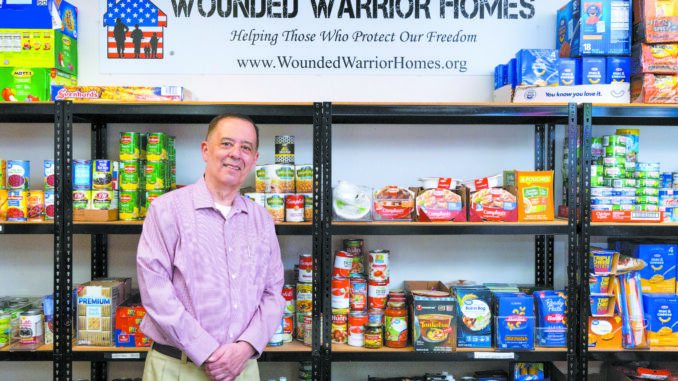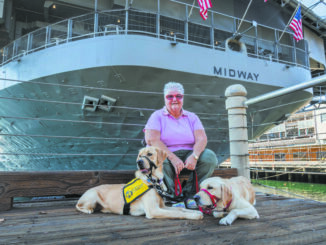
Wounded Warrior Homes offers housing and food assistance for veterans experiencing homelessness
by Whip Villarreal
Even after their service has ended, many vets will carry injuries they sustained—both visible and not visible—into civilian life. Many even find themselves living on the streets, with the Regional Task Force on Homelessness estimating there are about 1,000 veterans currently experiencing homelessness in the region. Wounded Warrior Homes (WWH) is dedicated to helping them survive and thrive.
Founded in 2014 and based in San Marcos, the non-profit organization provides transitional housing and integrative support services to veterans with disabilities sustained during active duty and veterans facing severe financial hardships. It also provides access to rehabilitation for vets struggling with addiction, counseling and even meals through its food pantry program.
Rick Espitia, chairman of WWH, says many of the unhoused veterans the organization assists struggle with mental and physical health issues, often linked directly to their time in the military. This is where WWH serves as a critical safety net for local veterans struggling with these challenges.
“I think one of the biggest impacts, besides helping out our unhoused veterans, is bringing awareness to the public of the situation and the plight that these individuals go through.”
Rick Espitia, Chairman, Wounded Warrior Homes
“I think one of the biggest impacts, besides helping out our unhoused veterans, is bringing awareness to the public of the situation and the plight that these individuals go through,” Espitia said. “Many times we ignore them when we see them on the street and don’t know that unhoused person on the corner may be a veteran, and maybe a veteran with a substance abuse issue or a mental health condition that really keeps him or her from obtaining the services that will help make their life better.”
While there has been improvement over the years in addressing and assisting unhoused veterans, Espitia says an ongoing challenge is identifying those veterans and tracking them down. He said that this is especially important to identify and find treatment for those with mental health and substance abuse issues. However, he is hopeful that with more resources and awareness, his organization and others can continue to tackle the issue.
“I think Ray Flores and the OMVA does an excellent job in trying to coordinate and identify what are the major issues and what services are needed for unhoused veterans in San Diego County,” Espitia said. “What he is doing working with the non-profits to better capture available funding and resources at the state and county level to better serve those veterans has been crucial for our mission.”
Food insecurity means more than just hunger for veterans, and especially for those with physical and mental scars. Inadequate nutrition hinders health and well-being and can exacerbate chronic health issues that plague both veterans and anyone experiencing homelessness. WWH partners with North County Food Bank and Feeding San Diego to meet these critical nutritional needs. WWH accepts donations of needed items to stock the pantry, with several of the most in-demand items listed on the WWH website.
More info about Wounded Warrior Homes can be found at www.woundedwarriorhomes.org. If you’d like to donate to the food pantry, call 760-205-5050 to arrange drop-off or pick-up.



